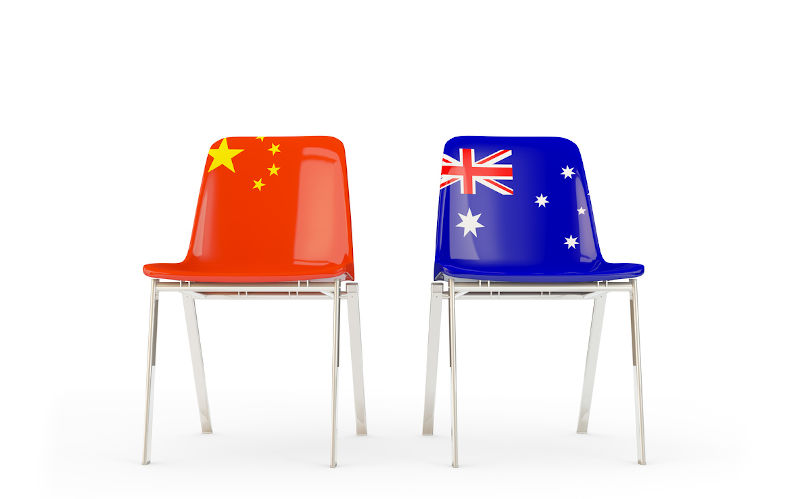The Turnbull and Morrison governments and the breakdown in Australias relations with China
July 26, 2022
The breakdown in relations between Canberra and Beijing during the years of the Turnbull and Morrison governments illustrates the emptiness of Australias claims to be a middle power in regional and global affairs.
There are two standout provocations that heralded the beginning of the diplomatic breakdown between Canberra and Beijing. The first was the Turnbull governments banning of the giant Chinese tech-company Huawei from operating in Australia. The second was when Morrisons Foreign Affairs minister Marise Payne publicly demanded that China comply with an international enquiry into the origins of the Covid-19 pandemic. In both cases Australia took the lead internationally in taking these actions.
The Turnbull governments adviser on China was John Garnaut. He notoriously warned that China was manipulating the internal affairs of Australias political system (see his How China interferes in Australia, Foreign Affairs, 9 March 2018). The eccentric academic Clive Hamilton joined in with his Silent Invasion: Chinas Influence in Australia a book redolent with alarmist claims about how some of Australias important cultural institutions were being infiltrated by Chinese influencers bent on subverting Australian democracy. Several other academics and eager minions in the Murdoch media happily repeated Hamiltons cranky thesis, despite the contentiousness on which much of it was based.
The Turnbull era stands in marked contrast to the Howard and Abbott years when China was seen as Australias most important and beneficent trading partner. Prime Minister Abbott hosted a visit by Chinas Xi Jinping to Canberra in 2014, inviting him to address the federal parliament, while finalising a free trade agreement between the two countries. Abbott was effusive in his praise for Xi. He saw the FTA as opening up real growth prospects for the Australian economy. However, once Abbott was ousted as Prime Minister, Turnbull downplayed the Howard and Abbott China legacy in order to cement his leadership within the turbulent ranks of the Liberal Party room and the Coalition government. Being hairy-chested about China would, he believed, appeal to the recalcitrant right of the government.
These actions sowed the seeds of Chinese resentment towards Australia. Meanwhile, Turnbull appeared oblivious to the profound implications of the rise of Xi Jinping as Chinas most powerful leader since Mao. This points to the tyranny of ignorance about Asia in general, and China in particular, which characterised the Turnbull government and much of the Australian media commentariat at that time and still does today. Who was Turnbull listening to apart from Garnaut Junior? Who was he reading apart from Hamilton the prophet from the provinces? Where were the Foreign Affairs officials from DFAT? Did they have any input to the Turnbull governments stance towards China?
The Morrison government expanded the critique of China that it inherited from Turnbull. Morrison never exhibited a deep understanding of Australian foreign policy. Far from it. He naively believed that his mateship with Trump gave him the strategic space to provoke China and foolishly led him to the dangerous conviction that the Donald would always have his back.
Marise Payne, Morrisons Foreign Affairs minister, was out of her depth on the international stage. She exhibited an alarming lack of understanding of what was going on within China while Xi was consolidating his power and what he intended to use it for notably, to return China to a position of eminence, if not pre-eminence, in the region and globally. Under Paynes watch, Australia moved closer to the United States as tensions ratcheted up between Beijing and Washington. On vivid display at this time was Australias dependent middle power identity with the government maintaining the myth that should China threaten Australia, Uncle Sam would hasten over the Pacific the keep us safe.
The Morrison government complacently parroted Americas (Trumps) contempt for Chinas (Xis) massively ambitious Belt and Road project designed to open trade routes for China across Asia, into Europe, and into Africa. While there was (and remains) much to be cautious about as far as Belt and Road is concerned, it was counterproductive for the Australian government to adopt a mostly dismissive view of the project. It should either have kept quiet, or it should have more actively sought to seek trade advantages for Australia by linking with more Belt and Road initiatives.
Morrisons most delinquent error, strategically, was to ignore the island states in the South Pacific that were clamouring for Australia to take a positive lead in global forums on climate change. The effects of rising sea levels on several of these states has been well documented for years now, but Morrison and his team were haughtily indifferent to their plight, clinging to their denialism about the science of global warming and their links with their fossil fuel allies. The door was left wide open for China to step into the region.
As the Morrison government veered towards its demise, the tone of its foreign policy towards China became shriller. In 2021, bureaucrat Mike Pezzullo secretary of the Department of Home Affairs, ominously warned that the drums of war were beating across the region. On ANZAC Day, Peter Dutton declared that war was likely as China threatened a military take-over of Taiwan. Both of these over-reaching claims point to the ignorance that these men senior spokespersons for the Australian government have of the nuances of the historical, cultural and political circumstances entailed in the relations between Beijing and Taipei, relations that have taken on a deeper complexity since the rise of Xi Jinping.
The point about Turnbull and Huawei, and about Marise Paynes accusations about the COVID-19 pandemic, is that under both the Turnbull and Morrison governments, Australia took the lead internationally in trumpeting accusations about these matters. It did so, convinced that its middle power credentials gave it the right to do so, while assuming that the rest of the free world would follow suite.
What Turnbull and Morrison failed to see was that they were being taken for a ride by their great and powerful friend. It is noteworthy that few countries were prepared to go out on a limb, in the triumphalist manner that both Turnbull and Morrison had. The most important of those allies stood back, to see what the consequences might be for Australia. For a damaging moment, Australia was a shag on a rock. China noticed this and struck back, ruthlessly.
Australias barley producers and exporters of coal, wine, and beef were all blocked by China which on 6 May 2021 announced that it would no longer engage in trade dialogues with Australia. Official contacts between Australia ministers and their Chinese counterparts were abruptly ended. China was painting Australia as Americas puppet and the Morrison government did nothing to counter this and everything to reinforce it.
At the base of this evidence of Australias extraordinary ineptitude in its dealings with China is its failure to comprehend the horrific consequences of a devastating conflict exploding between China and the United States. This diplomatic blindness is occurring at a time when America is a terminally divided and conflicted polity and society, declining as a regional power in the Asia Pacific. China is very aware of this, but Australia seems blithely unconcerned.
Its time for Australia to wake up to the fact that its middle power pretentions are entirely contingent on its unreliable alliance with an increasingly destabilised US an alliance that has reached its nadir. The worry is that Richard Marles, Defence Minister in the Albanese government, is as ideologically committed to the US alliance as Morrison and Payne were, and it seems he is every bit as ignorant about China as they were.

